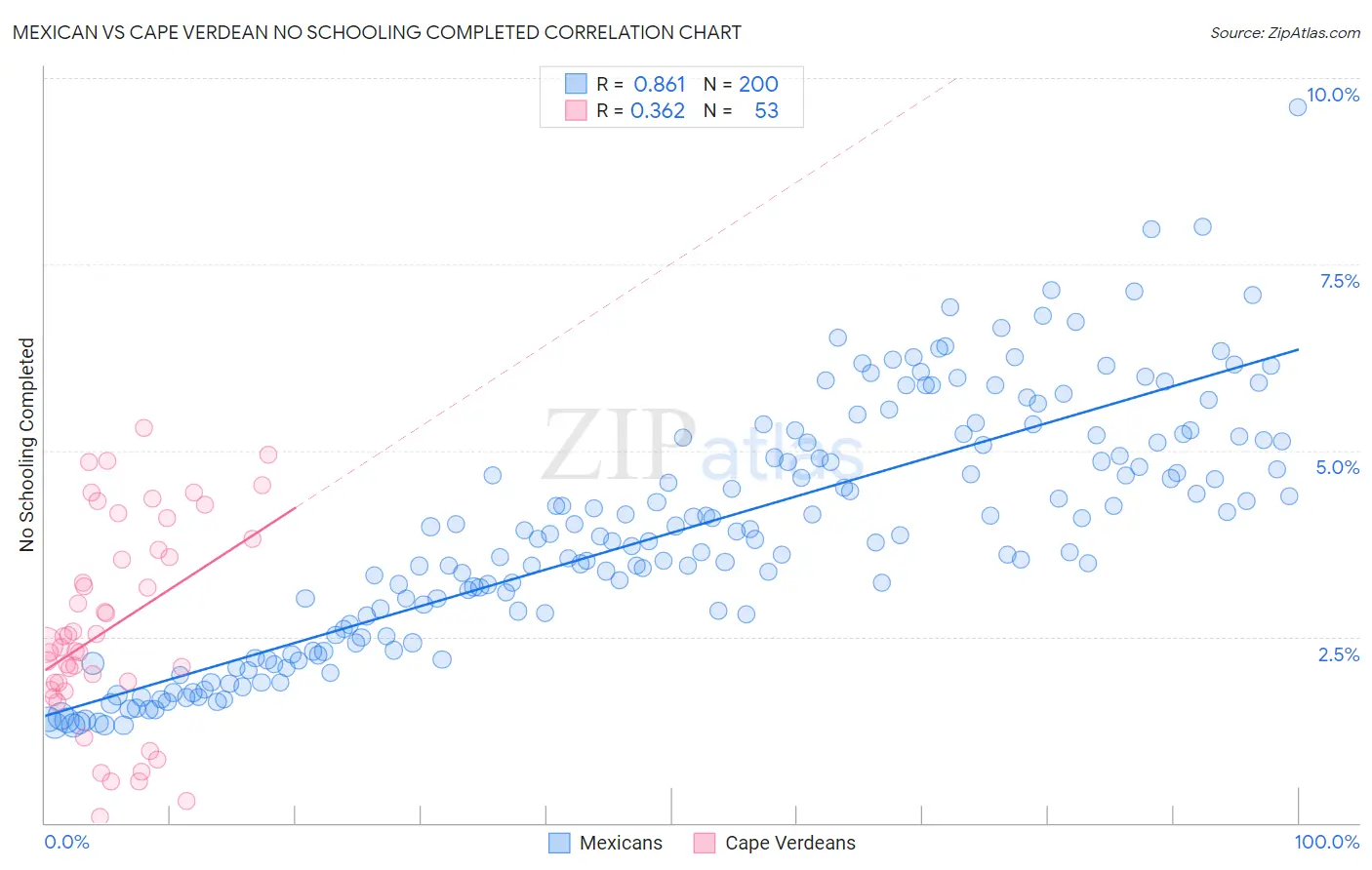Mexican vs Cape Verdean No Schooling Completed
COMPARE
Mexican
Cape Verdean
No Schooling Completed
No Schooling Completed Comparison
Mexicans
Cape Verdeans
3.3%
NO SCHOOLING COMPLETED
0.0/ 100
METRIC RATING
328th/ 347
METRIC RANK
3.1%
NO SCHOOLING COMPLETED
0.0/ 100
METRIC RATING
317th/ 347
METRIC RANK
Mexican vs Cape Verdean No Schooling Completed Correlation Chart
The statistical analysis conducted on geographies consisting of 549,296,204 people shows a very strong positive correlation between the proportion of Mexicans and percentage of population with no schooling in the United States with a correlation coefficient (R) of 0.861 and weighted average of 3.3%. Similarly, the statistical analysis conducted on geographies consisting of 107,247,027 people shows a mild positive correlation between the proportion of Cape Verdeans and percentage of population with no schooling in the United States with a correlation coefficient (R) of 0.362 and weighted average of 3.1%, a difference of 6.3%.

No Schooling Completed Correlation Summary
| Measurement | Mexican | Cape Verdean |
| Minimum | 1.3% | 0.088% |
| Maximum | 9.6% | 5.3% |
| Range | 8.3% | 5.2% |
| Mean | 3.9% | 2.6% |
| Median | 3.8% | 2.4% |
| Interquartile 25% (IQ1) | 2.5% | 1.8% |
| Interquartile 75% (IQ3) | 5.1% | 3.7% |
| Interquartile Range (IQR) | 2.6% | 1.9% |
| Standard Deviation (Sample) | 1.7% | 1.3% |
| Standard Deviation (Population) | 1.6% | 1.3% |
Demographics Similar to Mexicans and Cape Verdeans by No Schooling Completed
In terms of no schooling completed, the demographic groups most similar to Mexicans are Immigrants from Latin America (3.3%, a difference of 0.22%), Immigrants from Vietnam (3.3%, a difference of 1.1%), Immigrants from Armenia (3.3%, a difference of 1.5%), Japanese (3.3%, a difference of 1.5%), and Indonesian (3.2%, a difference of 2.7%). Similarly, the demographic groups most similar to Cape Verdeans are Immigrants from Ecuador (3.1%, a difference of 0.49%), Immigrants from Guyana (3.1%, a difference of 0.68%), Immigrants from Nicaragua (3.1%, a difference of 0.84%), Immigrants from Belize (3.1%, a difference of 1.1%), and Honduran (3.1%, a difference of 1.2%).
| Demographics | Rating | Rank | No Schooling Completed |
| Sri Lankans | 0.0 /100 | #312 | Tragic 3.0% |
| Hondurans | 0.0 /100 | #313 | Tragic 3.1% |
| Immigrants | Belize | 0.0 /100 | #314 | Tragic 3.1% |
| Immigrants | Nicaragua | 0.0 /100 | #315 | Tragic 3.1% |
| Immigrants | Ecuador | 0.0 /100 | #316 | Tragic 3.1% |
| Cape Verdeans | 0.0 /100 | #317 | Tragic 3.1% |
| Immigrants | Guyana | 0.0 /100 | #318 | Tragic 3.1% |
| Immigrants | Burma/Myanmar | 0.0 /100 | #319 | Tragic 3.1% |
| Immigrants | Bangladesh | 0.0 /100 | #320 | Tragic 3.1% |
| Immigrants | Laos | 0.0 /100 | #321 | Tragic 3.1% |
| Immigrants | Honduras | 0.0 /100 | #322 | Tragic 3.2% |
| Vietnamese | 0.0 /100 | #323 | Tragic 3.2% |
| Mexican American Indians | 0.0 /100 | #324 | Tragic 3.2% |
| Dominicans | 0.0 /100 | #325 | Tragic 3.2% |
| Indonesians | 0.0 /100 | #326 | Tragic 3.2% |
| Immigrants | Latin America | 0.0 /100 | #327 | Tragic 3.3% |
| Mexicans | 0.0 /100 | #328 | Tragic 3.3% |
| Immigrants | Vietnam | 0.0 /100 | #329 | Tragic 3.3% |
| Immigrants | Armenia | 0.0 /100 | #330 | Tragic 3.3% |
| Japanese | 0.0 /100 | #331 | Tragic 3.3% |
| Central Americans | 0.0 /100 | #332 | Tragic 3.4% |